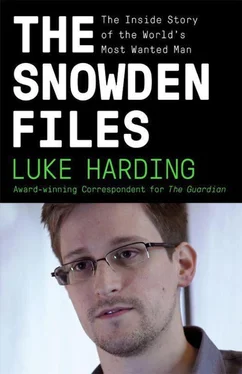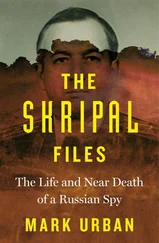At this point there was a loud bing-bang-bong! The airport tannoy burst into Russian and English; it announced the business lounge could be found on the third floor, next to gate 39. Snowden folded his body and smiled; his small audience laughed with him. When he resumed, another blaring message sawed him off. ‘I have heard this many times over the last couple of weeks,’ Snowden said croakily. Harrison joked she knew the announcements so well, she could practically sing along to them.
Snowden’s substantive points were interesting. He said that secret US FISA court rulings ‘somehow legitimise an illegal affair’ and ‘simply corrupt the most basic notion of justice – that it must be seen to be done’. He also traced his own actions back to the Nuremberg trials of 1945, quoting: ‘Individuals have international duties which transcend the national obligations of obedience.’ And he defended himself from criticism that he had deliberately set out to hurt, or even irreparably damage, US national security:
‘Accordingly, I did what I believed right and began a campaign to correct this wrongdoing. I did not seek to enrich myself. I did not seek to sell US secrets. I did not partner with any foreign governments to guarantee my safety. Instead, I took what I knew to the public, so what affects all of us can be discussed by all of us in the light of day, and I asked the world for justice. The moral decision to tell the public about spying that affects all of us has been costly, but it was the right thing to do and I have no regrets.’
Snowden interpreted the US government’s global pursuit of him as ‘a warning to all others who might speak out as I have’. No-fly lists, the threat of sanctions, the ‘unprecedented step of ordering military allies to ground a Latin American president’s plane’ – all were what he called ‘dangerous escalations’. He then praised countries that had offered him support and asylum in the face of ‘this historically disproportionate aggression’. Snowden cited Russia, Venezuela, Bolivia, Nicaragua and Ecuador:
‘[They] have my gratitude and respect for being the first to stand against human rights violations carried out by the powerful against the powerless. By refusing to compromise their principles in the face of intimidation they have earned the respect of the world. It is my intention to travel to each of these countries to extend my personal thanks to their people and leaders.’
And then an announcement: Snowden said he was requesting asylum from Russia. He made clear this was a temporary move, forced upon him by circumstances, and until such time as he could travel to Latin America. He said he wanted the activists to petition the US and Europe not to interfere with his movements. The meeting broke up after 45 minutes.
‘Mr Snowden is not a phantom: such a man exists,’ Genri Reznik, a defence lawyer, said afterwards, as he and the other guests were reunited with the media scrum in Terminal F. ‘I shook his hand. I could feel skin and bones,’ Vladimir Lukin, Russia’s human rights commissioner, told Russian TV, ‘He [Snowden] said that of course he is concerned about freedom of movement, lack of it, but as for the rest, he is not complaining about living conditions. As he said: “I’ve seen worse situations.”’
Snowden’s prolonged stay in Russia was involuntary. He got stuck. But it made his own story – his narrative of principled exile and flight – a lot more complicated. It was now easier for critics to paint him not as a political refugee but as a 21st-century Kim Philby, the British defector who sold his country and its secrets to the Soviets.
Other critics likened him to Bernon F Mitchell and William H Martin, two NSA analysts who defected in 1960 to the Soviet Union, and had a miserable time there for the rest of their lives. Martin and Mitchell flew to Cuba and then boarded a Soviet freighter, popping up in Moscow several months later at a press conference in the House of Journalists. There, they denounced their former employer, and revealed that the US spied on its allies and deliberately sent aircraft into Soviet airspace to trigger and capture Soviet radar patterns.
The analogies were unfair. Snowden was no traitor. He wasn’t a Mitchell or a Martin or a Philby. But, for better or worse, the 30-year-old American was now dependent on the Kremlin and its shadowy spy agencies for protection and patronage.
For anyone who knew Russia – its brutal wars in Chechnya, its rigged elections, its relentless hounding of critics – part of Snowden’s speech struck a tin note. Russia may have stood against human rights violations in Snowden’s case. But this wasn’t because the Russian government believed in human rights; it didn’t. Putin frequently talked of human rights in disparaging terms. Rather, he saw Snowden as a pawn in a new great game, and as a golden opportunity to embarrass Washington, Moscow’s then-and-now adversary.
The very day before Snowden’s unlikely press briefing, one of the most surreal moments in legal history had taken place. In scenes that could have been written by Gogol, Russia had put a dead man on trial. The 37-year-old auditor Sergei Magnitsky died in prison in 2009. Magnitsky had uncovered a massive tax fraud inside Russia’s interior ministry. The corrupt officials involved arrested him; in jail he was refused medical treatment and tortured. The case had become a totemic one for the Kremlin and the White House, after the US and some EU states banned the Russian officials involved and froze their overseas assets. Where the defendant should have been was an empty cage. It was a Dadaist spectacle.
A week later, Russia’s vocal opposition leader Alexei Navalny also appeared in court. A lawyer and anti-corruption blogger, with a substantial middle-class following, and sometimes darkly nationalist views, Navalny was Putin’s best-known opponent. (Putin was unable to bring himself to utter Navalny’s name, and referred to him disparagingly as ‘that gentleman’.) Navalny was jailed for five years for ‘stealing’ from a timber firm. Nobody really believed the charges. The sentence was later suspended in what looked like a moment of Kremlin in-fighting.
Russia’s direction of travel, then, was becoming murkier; corruption, show trials and political pressure on the judiciary were everyday facts of life. In a very KGB twist, Putin had passed a new law requiring all nongovernmental organisations that received western funding to register as ‘foreign agents’. Ahead of the 2014 winter Olympics, to be held in the Black Sea resort of Sochi, the Duma had enacted legislation against ‘gay propaganda’. These moves were part of a wider political strategy in which Putin appealed directly to his conservative base – workers, pensioners, state employees – over the heads of Moscow’s educated and restive bourgeoisie.
According to the activists who met him at Sheremetyevo, Snowden had several new minders. Who were they? All of Moscow assumed they were undercover agents from the FSB.
The FSB is Moscow’s pre-eminent intelligence agency. It is a prodigiously resourced organisation that operates according to its own secret rules. After the collapse of the Soviet Union the KGB was dissolved. But it didn’t disappear. In 1995 most of the KGB’s operations were transferred to the new FSB. Nominally it carries out the same functions as the FBI and other western law enforcement agencies – criminal prosecution, investigations into organised crime and counter-terrorism. But its most important job is counter-espionage.
One of the lawyers invited to Snowden’s 12 June press conference was Anatoly Kucherena. Afterwards Snowden sent an email to Kucherena and asked for his help. Kucherena agreed. He returned to Sheremetyevo two days later and held a long meeting with Snowden. He explained Russian laws. He also suggested Snowden abandon his other asylum requests. ‘I don’t know why he picked me,’ the lawyer says.
Читать дальше












